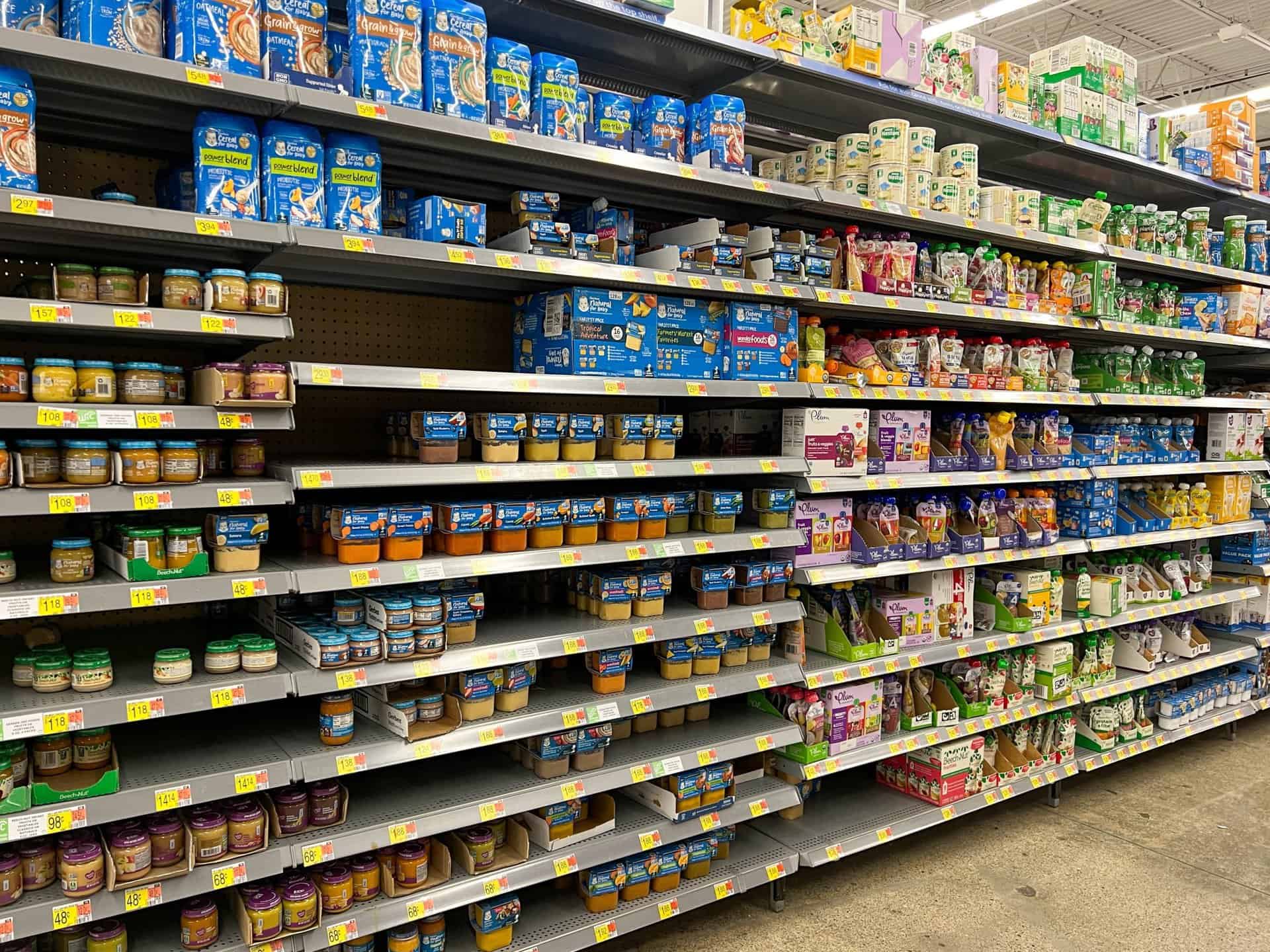Nestle Baby Food: Toxic Baby Food Lawsuit
- Last Updated: June 12th, 2025

Attorney Jessica Paluch-Hoerman, founder of TruLaw, has over 28 years of experience as a personal injury and mass tort attorney, and previously worked as an international tax attorney at Deloitte. Jessie collaborates with attorneys nationwide — enabling her to share reliable, up-to-date legal information with our readers.
Legally Reviewed
This article has been written and reviewed for legal accuracy and clarity by the team of writers and legal experts at TruLaw and is as accurate as possible. This content should not be taken as legal advice from an attorney. If you would like to learn more about our owner and experienced injury lawyer, Jessie Paluch, you can do so here.
Fact-Checked
TruLaw does everything possible to make sure the information in this article is up to date and accurate. If you need specific legal advice about your case, contact us by using the chat on the bottom of this page. This article should not be taken as advice from an attorney.
Key takeaways:
- Nestlé, a major baby food manufacturer, is facing lawsuits alleging that its products contain dangerously high levels of toxic heavy metals like arsenic, lead, cadmium, and mercury, which can cause severe neurological damage and developmental delays in infants and young children.
- Studies have shown that exposure to toxic metals in baby food can lead to an increased risk of autism spectrum disorders, ADHD, lowered IQ, speech and language delays, stunted growth, weakened immune function, and other serious health issues in children.
- The revelation of toxic metals in Nestlé baby foods has sparked calls for stronger regulations and oversight, with the FDA investigating the company's safety practices and lawmakers introducing legislation to set strict limits on contaminant levels and increase transparency through mandatory testing and labeling.
Overview of the Nestlé Baby Food Lawsuit
On this page, we’ll provide an overview of the Nestlé Baby Food Lawsuit, regulatory responses to Nestlé baby food toxicity concerns, how to file a Toxic Baby Food Lawsuit, and much more.
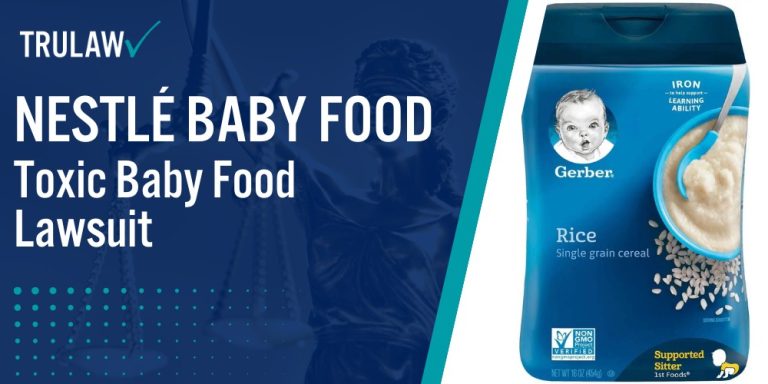
Intro to the Nestlé Baby Food Toxic Baby Food Lawsuit
Nestlé, particularly its Gerber brand (which it previously owned), is facing significant legal challenges due to the presence of toxic heavy metals found in its baby food products.
These heavy metals, including arsenic, lead, cadmium, and mercury, are linked to serious health concerns.
The Nestlé baby food products containing the highest levels of heavy metal contamination include:
- Rice Single Grain Cereal: 3.9 ppb lead, 106 ppb arsenic, 11.1 ppb cadmium, 1.79 ppb mercury.
- Oatmeal Single Grain Cereal: 3 ppb lead, 26.9 ppb arsenic, 13 ppb cadmium, less than 0.281 ppb mercury.
- 100% Apple Prune Juice from Concentrate – Toddler 12+ months: 3.3 ppb lead, 5.6 ppb arsenic, less than 0.5 ppb cadmium, less than 0.136 ppb mercury.
- Carrots – Sitter 2nd foods: 9.4 ppb lead, less than 2.2 ppb arsenic, 31.4 ppb cadmium, 0.214 ppb mercury.
- Sweet Potatoes – Sitter 2nd Food: 29.3 ppb lead, 3.9 ppb arsenic, 5.8 ppb cadmium, less than 0.138 ppb mercury.
The presence of these contaminants is particularly concerning because of the potential long-term impact on cognitive development and overall health, including an increased risk of conditions like autism spectrum disorder (ASD) and attention-deficit/hyperactivity disorder (ADHD)
If your child has consumed Nestlé baby food products and developed health issues such as neurological damage, decreased IQ, or behavioral problems, you may be eligible for compensation.
Contact TruLaw using the chat on this page to receive an instant case evaluation and determine your eligibility to join others in filing a Nestlé baby food lawsuit today.
Table of Contents
Toxic Heavy Metals in Nestlé Baby Food
Nestlé, a global food giant, has been involved in recent legal actions over its marketing and production practices, particularly concerning infant formula products and baby food products.
Recent reports have brought to light concerning levels of toxic heavy metals—such as arsenic, lead, cadmium, and mercury—in popular Nestlé baby food products.
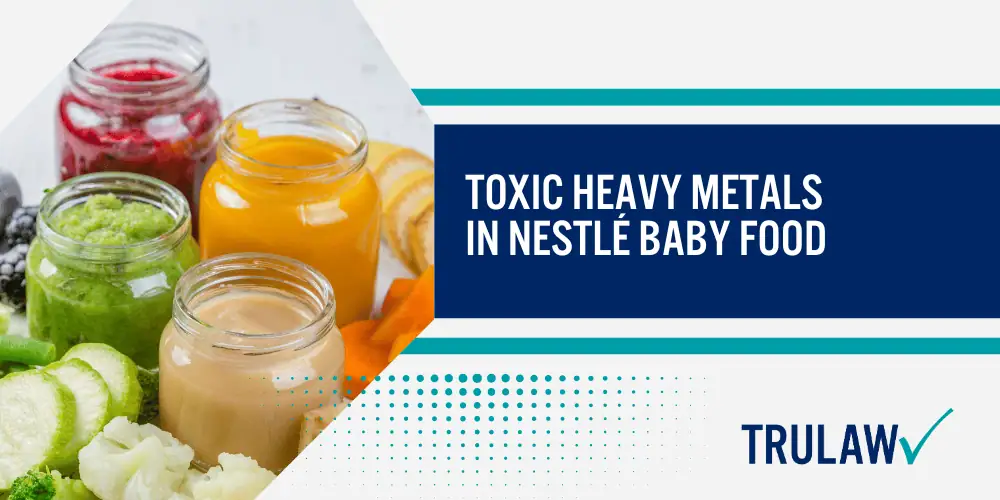
Exposure to these metals can be particularly harmful to young children, leading to severe health issues.
Nestlé Baby Food Contaminated with Toxic Heavy Metals
A congressional investigation revealed that several major baby food companies, including Nestlé, knowingly sold products with high levels of toxic metals.
These heavy metals are claimed to cause severe neurodevelopmental disorders in children, including autism spectrum disorder (ASD) and attention deficit hyperactivity disorder (ADHD).
The findings have prompted a wave of litigation against Nestlé and other companies, accusing them of negligence and strict liability for selling harmful products.
Scientific Studies Highlight the Risks of Nestlé Baby Food
Numerous studies have shown the dangers of toxic heavy metals in baby food products like those sold by Nestlé.
Even low levels of exposure to these contaminants during months of age can lead to lasting neurological damage and developmental delays.
Public health agencies, including the World Health Organization, and medical professional organizations have voiced concerns about the risks these metals pose to infants and toddlers consuming Nestlé baby foods.
Nestlé Baby Food Lawsuit Consolidation and Court Proceedings
A series of lawsuits have been filed against Nestlé and other major baby food manufacturers, alleging that their products contain dangerously high levels of toxic heavy metals.
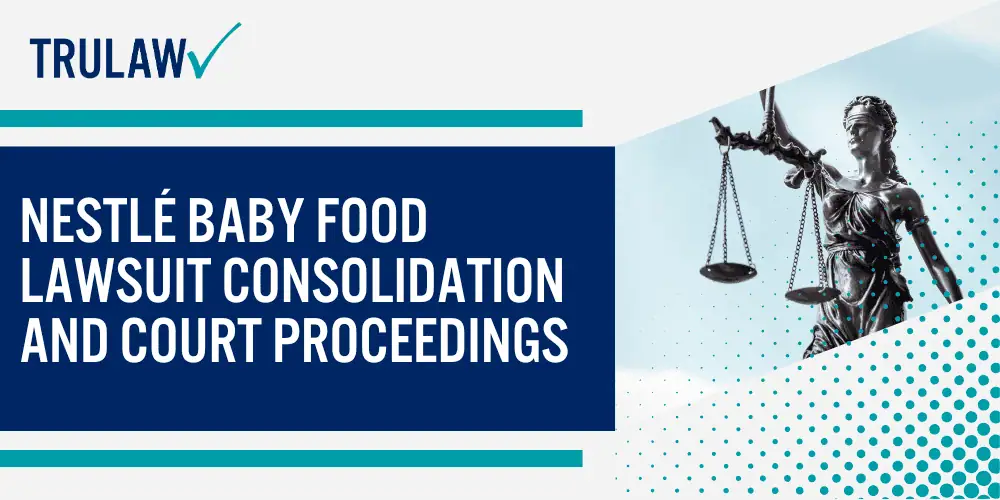
The lawsuits have been consolidated into a Multidistrict Litigation (MDL) to improve efficiency and ensure consistent rulings across the various cases.
Multidistrict Litigation (MDL) Combines Nestlé Baby Food Cases
The Nestlé baby food lawsuits are part of an MDL (Case No. 3:24-md-03101-JSC) under U.S. District Judge Jacqueline Scott Corley in the Northern District of San Francisco.
The plaintiffs’ master complaint consolidates the common factual and legal issues from numerous individual lawsuits into a single document:
- The MDL currently has over 30 lawsuits pending against Nestlé and other baby food companies.
- Four new defendants were recently added to the master complaint.
- More cases are expected to be filed and join the MDL in the coming months.
- Significant efforts have been made to streamline the legal process.
The consolidation of these cases into an MDL highlights the widespread nature of the allegations against Nestlé and the baby food industry as a whole.
As more families come forward with claims of harm caused by toxic metals in Nestlé products, the pressure on the company to take responsibility and make nutritionally balanced changes to its manufacturing processes will likely intensify.
The MDL provides a streamlined path for these families to seek justice and hold Nestlé accountable for the safety of its baby foods.
Bellwether Trials Set the Stage for Nestlé Baby Food Settlements
As the Nestlé baby food MDL progresses, a series of bellwether trials will likely be scheduled.
These initial test cases help gauge the strength of the plaintiffs’ claims and guide potential settlement negotiations with Nestlé.
Positive outcomes for plaintiffs in the bellwether trials could put pressure on Nestlé to offer substantial settlements to resolve the growing number of baby food lawsuits it faces.
However, the company may choose to defend itself aggressively in court if it believes it can prevail against the allegations.
Health Impacts of Toxic Metals in Nestlé Baby Food
Exposure to toxic heavy metals like those found in Nestlé baby foods poses severe risks to the health and development of infants and young children.
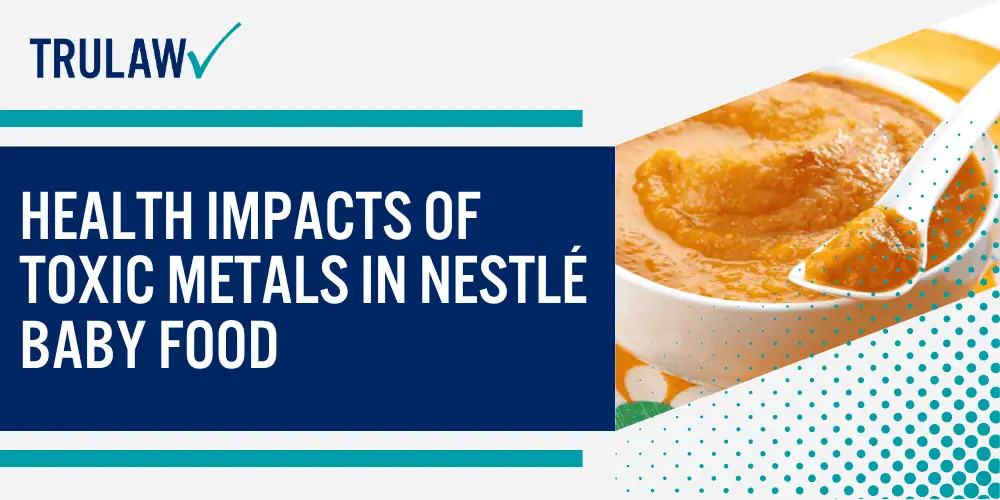
Even at low levels, these contaminants can cause lasting harm when consumed during critical stages of baby’s growth.
Nestlé Baby Food Exposure Linked to Neurological Damage in Children
Studies have linked early childhood exposure to toxic metals to various neurological problems later in life.
Children who regularly consumed Nestlé baby foods contaminated with high levels of arsenic, lead, cadmium, and mercury may face an increased risk of:
- Autism spectrum disorders
- ADHD and other behavioral issues
- Lowered IQ and cognitive deficits
- Speech and language delays
- Other serious health issues
The potential for severe and irreversible neurological harm in children exposed to toxic metals in Nestlé baby foods is a major concern for parents and public health experts alike.
As the lawsuits progress and more research is conducted, the full extent of the damage caused by these contaminants may become even clearer.
Families affected by this issue deserve answers and support as they navigate the challenges of caring for children who may face lifelong consequences from consuming unsafe baby foods.
Nestlé Baby Food Tied to Developmental Delays and Other Health Issues
A study by Healthy Babies Bright Futures found that 95% of baby foods tested contained one or more toxic heavy metals, with 1 in 4 baby foods containing all four metals of greatest concern: arsenic, lead, cadmium, and mercury.
Another report by the U.S. House Committee on Oversight and Reform revealed that some baby foods sold by Nestlé and other major manufacturers contained up to 91 times the arsenic level, up to 177 times the lead level, up to 69 times the cadmium level, and up to 5 times the mercury level allowed in bottled water.
In addition to neurological harm, toxic metals in Nestlé baby foods have been associated with other health concerns in children, such as:
- Stunted growth and physical development
- Weakened immune system function
- Increased risk of certain childhood cancers
- Kidney and liver damage
- Other severe development complications
Parents are understandably worried about the long-term effects their children may suffer due to consuming dangerous levels of heavy metals in Nestlé products marketed as safe and healthy for babies.
Regulatory Responses to Nestlé Baby Food Toxicity Concerns
The revelation of toxic metals in Nestlé baby foods has sparked calls for stronger regulations and oversight of the industry.
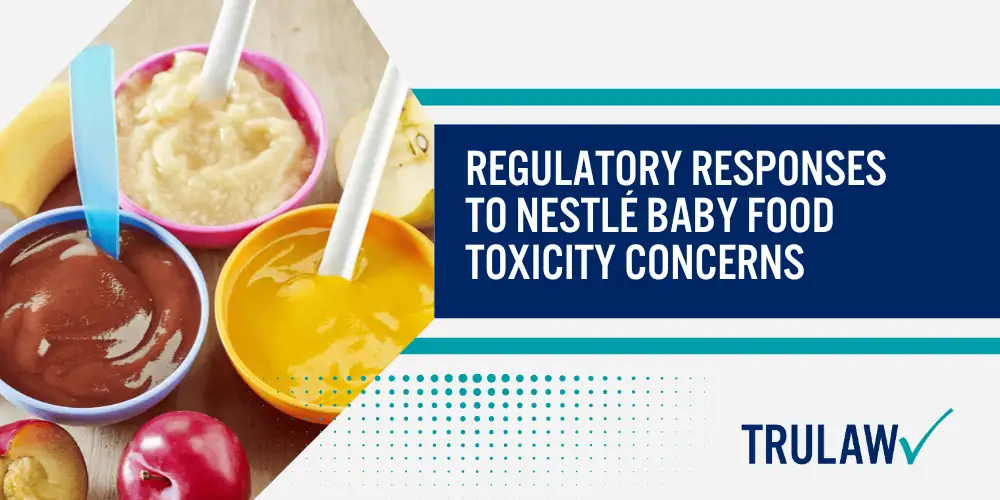
Government agencies and lawmakers are facing pressure to take action to protect children’s health.
FDA Investigations into Nestlé Baby Food Safety
The U.S. Food and Drug Administration (FDA) has opened investigations into Nestlé and other baby food manufacturers following reports of unsafe levels of heavy metals in their products.
The agency is facing criticism for previously failing to set and enforce strict standards for these contaminants in foods for infants and young children.
As a result of the Nestlé baby food lawsuits and growing public outrage, the FDA has vowed to reevaluate its policies and consider implementing new regulations to limit toxic metals in early life foods.
Legislative Actions Targeting Nestlé Baby Food and Other Brands
In response to the Nestlé baby food controversy, members of Congress have introduced legislation aimed at forcing the industry to reduce heavy metals and increase transparency.
Proposed bills would set stringent limits on the levels of arsenic, lead, cadmium, and mercury allowed in baby foods, requiring manufacturers like Nestlé to regularly test and report contaminant levels.
Some lawmakers are also pushing for mandatory labeling to inform parents about the presence of toxic metals in infant cereals.
Public Awareness and Consumer Reactions to the Nestlé Baby Food Lawsuit
News of the Nestlé baby food lawsuits and the presence of toxic metals in the company’s products has sparked widespread concern and anger among consumers, especially parents of young children.
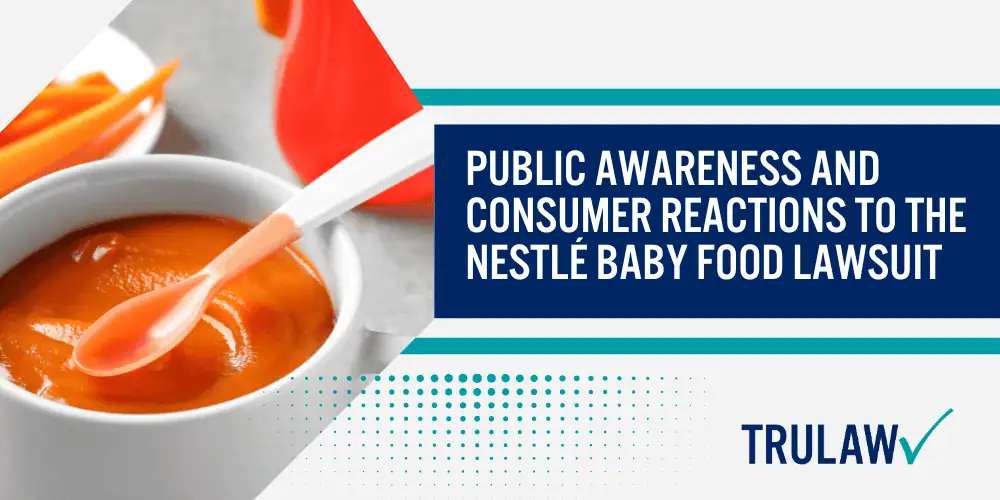
Many are reevaluating their trust in Nestlé and other major baby food brands.
Growing Concern Among Parents Regarding Nestlé Baby Food Safety
As more details emerge about the extent of heavy metal contamination in Nestlé baby foods, parents are growing increasingly worried about the potential harm to their children’s health.
Some are swearing off Nestlé products altogether, opting for homemade baby food or seeking out brands with proven commitments to safety and transparency.
Social media has become a hotbed of discussion and activism, with parents sharing information about the Nestlé lawsuits and alternative feeding options.
Advocacy Groups Push for Stricter Regulations on Baby Food
Consumer advocacy organizations and public health groups are seizing on the Nestlé baby food controversy to push for sweeping reforms in the industry.
They argue that the current lack of strict regulations and oversight has allowed companies like Nestlé to prioritize profits over children’s safety.
These groups are mobilizing parents and concerned citizens to demand action from regulators and lawmakers, calling for:
- Mandatory testing and reporting of toxic metal levels in baby foods
- Strict limits on the allowable amounts of these contaminants
- Clear labeling to inform parents about potential risks
- Increased funding for research into the health effects of toxic metal exposure in early childhood
As the Nestlé baby food lawsuits move forward and public pressure mounts, the company will likely face growing calls to take responsibility for the harm caused by its contaminated products and make significant efforts to ensure that baby foods are safe for consumption by all children.
Nestlé’s Global Reach and Impact
Nestlé’s influence spans several countries, particularly in regions such as Latin America, where their products are widely consumed.
The concerns raised by these lawsuits not only affect consumers in the U.S. but also raise questions about the safety of Nestlé baby foods sold globally.
This controversy underscores the importance of adhering to commonly accepted scientific guidelines for infant nutrition and ensuring that products marketed for healthy eating habits truly meet the safety standards that parents expect.
As this issue unfolds, parents and caregivers must remain vigilant, and companies must prioritize the safety and well-being of the youngest and most vulnerable members of society.
Whether through the use of breast milk or carefully vetted baby formula, the choices made during the parenting journey have lasting impacts on a child’s future.
Awareness of harmful ingredients like refined sugar and added sugar further highlights the need for more transparent and accountable practices in the baby food industry.
Toxic Baby Food Lawsuit Frequently Asked Questions
-
Recent reports have revealed concerning levels of toxic heavy metals, such as arsenic, lead, cadmium, and mercury, in popular Nestlé baby food products.
Exposure to these metals can be particularly harmful to young children, leading to severe health issues and developmental disorders.
-
Studies have linked early childhood exposure to toxic metals to various neurological problems later in life, such as autism spectrum disorders, ADHD, lowered IQ, and speech delays.
Other health concerns include stunted growth, weakened immune system function, and increased risk of certain childhood cancers.
-
The Nestlé baby food lawsuits have been consolidated into a Multidistrict Litigation (MDL) under U.S. District Judge Jacqueline Scott Corley in the Northern District of San Francisco.
If your child has consumed Nestlé baby food products and developed health issues such as neurological damage, decreased IQ, or behavioral problems, you may be eligible for compensation.
Contact TruLaw using the chat on this page to receive an instant case evaluation and determine your eligibility to join others in filing a Nestlé baby food lawsuit today.
-
Bellwether trials in the Nestlé baby food MDL will serve as initial test cases to gauge the strength of the plaintiffs’ claims and guide potential settlement negotiations with Nestlé.
Positive outcomes for plaintiffs in these trials could put pressure on Nestlé to offer substantial settlements to resolve the growing number of lawsuits it faces.
-
The U.S. Food and Drug Administration (FDA) has opened investigations into Nestlé and other baby food manufacturers following reports of unsafe levels of heavy metals in their products.
Additionally, members of Congress have introduced legislation aimed at forcing the industry to reduce heavy metals and increase transparency in baby food products.
-
Consumer advocacy organizations and public health groups are pushing for sweeping reforms in the baby food industry, demanding mandatory testing and reporting of toxic metal levels, strict limits on allowable amounts of contaminants, clear labeling, and increased funding for research.

Managing Attorney & Owner
With over 25 years of legal experience, Jessica Paluch-Hoerman is an Illinois lawyer, a CPA, and a mother of three. She spent the first decade of her career working as an international tax attorney at Deloitte.
In 2009, Jessie co-founded her own law firm with her husband – which has scaled to over 30 employees since its conception.
In 2016, Jessie founded TruLaw, which allows her to collaborate with attorneys and legal experts across the United States on a daily basis. This hypervaluable network of experts is what enables her to share the most reliable, accurate, and up-to-date legal information with our readers!
Additional Toxic Baby Food Lawsuit resources on our website:
Here, at TruLaw, we’re committed to helping victims get the justice they deserve.
Alongside our partner law firms, we have successfully collected over $3 Billion in verdicts and settlements on behalf of injured individuals.
Would you like our help?
At TruLaw, we fiercely combat corporations that endanger individuals’ well-being. If you’ve suffered injuries and believe these well-funded entities should be held accountable, we’re here for you.
With TruLaw, you gain access to successful and seasoned lawyers who maximize your chances of success. Our lawyers invest in you—they do not receive a dime until your lawsuit reaches a successful resolution!
AFFF Lawsuit claims are being filed against manufacturers of aqueous film-forming foam (AFFF), commonly used in firefighting.
Claims allege that companies such as 3M, DuPont, and Tyco Fire Products failed to adequately warn users about the potential dangers of AFFF exposure — including increased risks of various cancers and diseases.
Depo Provera Lawsuit claims are being filed by individuals who allege they developed meningioma (a type of brain tumor) after receiving Depo-Provera birth control injections.
A 2024 study found that women using Depo-Provera for at least 1 year are five times more likely to develop meningioma brain tumors compared to those not using the drug.
Suboxone Tooth Decay Lawsuit claims are being filed against Indivior, the manufacturer of Suboxone, a medication used to treat opioid addiction.
Claims allege that Indivior failed to adequately warn users about the potential dangers of severe tooth decay and dental injuries associated with Suboxone’s sublingual film version.
Social Media Harm Lawsuits are being filed against social media companies for allegedly causing mental health issues in children and teens.
Claims allege that companies like Meta, Google, ByteDance, and Snap designed addictive platforms that led to anxiety, depression, and other mental health issues without adequately warning users or parents.
Transvaginal Mesh Lawsuits are being filed against manufacturers of transvaginal mesh products used to treat pelvic organ prolapse (POP) and stress urinary incontinence (SUI).
Claims allege that companies like Ethicon, C.R. Bard, and Boston Scientific failed to adequately warn about potential dangers — including erosion, pain, and infection.
Bair Hugger Warming Blanket Lawsuits involve claims against 3M — alleging their surgical warming blankets caused severe infections and complications (particularly in hip and knee replacement surgeries).
Plaintiffs claim 3M failed to warn about potential risks — despite knowing about increased risk of deep joint infections since 2011.
Baby Formula NEC Lawsuit claims are being filed against manufacturers of cow’s milk-based baby formula products.
Claims allege that companies like Abbott Laboratories (Similac) and Mead Johnson & Company (Enfamil) failed to warn about the increased risk of necrotizing enterocolitis (NEC) in premature infants.
Here, at TruLaw, we’re committed to helping victims get the justice they deserve.
Alongside our partner law firms, we have successfully collected over $3 Billion in verdicts and settlements on behalf of injured individuals.
Would you like our help?
